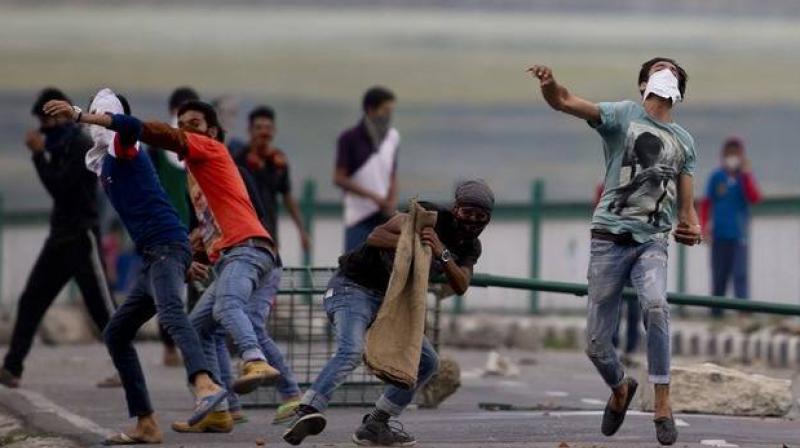UN report on Kashmir is a challenge to Delhi

A 49-page and first-ever United Nations report by the Office of the High Commissioner for Human Rights (OHCHR) on “Jammu and Kashmir, Azad Kashmir and Gilgit and Baltistan” took India by surprise last week and elicited an extremely strong reaction from New Delhi. With a three-week session of the 47-member UN Human Rights Council beginning in Geneva on June 18, coinciding with the 70th anniversary of the Universal Declaration of Human Rights, an extremely tendentious report focusing on the situation in J&K is bad news. Currently, India is not a member of the council while Pakistan is till 2020. High commissioner Zeid Ra’ad al-Hussein, of the Jordanian ruling family, said he will urge “the Human Rights Council to consider establishing a commission of inquiry to conduct a comprehensive independent international investigation into allegations of human rights violations in Kashmir”. This is a serious challenge for India.
India’s debunking of the report is justified due to its many inaccuracies and dependence on the media or other one-sided reports as well as the treatment of UN-listed terrorist outfits like Lashkar-e-Tayyaba/Jamaat-ud-Dawa or Hizbul Mujahideen as “fighters”. But India too cannot escape blame for adopting, since the death of Burhan Wani in July 2016, tactics that have been severely criticised even by Indian commentators and analysts. For instance, the use of pellet guns without properly training the security forces, or specifying their safe range, caused injuries, particularly to the eyes of stone-pelters, disproportionate to the provocation. Although India eventually obtained a sullen calm in the Valley, recent reports about militants killed or apprehended indicate most joined the militancy due to rough treatment by the security forces.
The goodwill generated by the relief to the common man by the Ramzan and Id ceasefire announced by the Union government has been negated by the killing of well-known and balanced Kashmiri journalist Shujaat Bukhari as well as Indian soldier Aurangzeb of Kashmiri origin. With the Ramzan period over, the Centre has also called off the ceasefire. The aim of the handlers of Pakistani militants was to provoke the security agencies to resume strong counter-measures as the Human Rights Council convenes in Geneva. India would need considerable diplomatic heft to keep the council from acting on the high commissioner’s call for an investigation. India would argue that such inquiries are not undertaken, as per guidelines of the council, where avenues exist within a country for recourse to the courts to settle complaints of misuse of power by the security agencies. Moreover, the four-yearly Universal Periodic Review of the Indian record on human rights was undertaken last year, and India is now examining the suggestions of members for suitable action in Kashmir and elsewhere.
The latest report is, however, Kashmir-specific and looking at the period July 2016 to end March 2018. The high commissioner’s apparent ire may be due to India’s refusal over the past two years to allow any UN team to visit Jammu and Kashmir for assessment. India has traditionally held that J&K is an internal issue outside the UN’s purview. After 1971, India has not even allowed the United Nations Military Observer Group (UNMOGIP) access, arguing that the Shimla Agreement now defines bilateral dealings.
While the report attempts to appear balanced, criticising Pakistani actions in the parts of Kashmir that it occupies, the real target is clearly India. Strongly condemning the Armed Forces (Special Powers) Act (AFSPA), the report alleges that in the 28 years of its existence “there has not been a single prosecution of armed forces personnel granted by the Central government”. The use of a human shield by Maj. Gogoi, for which he was unwisely given an award by the Army Chief even before an inquiry into the episode was complete, is seen as an example of overreach by the security forces. The Ajit Doval-Narendra Modi doctrine of “zero tolerance” of terror has thus hit an international wall by virtue of its purely strongarm approach to counter terrorism.
India should be able to stymie any inquiry by the council as even some council members like Saudi Arabia and the UAE will not automatically align behind Pakistan, both due to bilateral closeness with India as well as their own serious concerns about Pakistani-sponsored terror. Of the five permanent members of the UN Security Council, France and Russia are not members of the Human Rights Council. Even Pakistan’s ally China and a member has a far worse record than India’s over human rights abuses in Xinjiang, where artificial intelligence-based surveillance totally breaches the privacy of ethnic minorities. Pakistan’s own record in Balochistan and Khyber-Pakhtunkhwa escapes this UN report as it is Kashmir specific. The report’s biggest weakness is the creation of moral equivalence between the Indian security forces and UN-listed militant outfits sponsored by the Pakistani state.
The Modi government now faces a conundrum as it cannot revert to a pure iron-fisted approach, unaccompanied by a hearts-and–minds outreach, as its actions will be closely watched in Geneva. Nominating a former Intelligence Bureau director as J&K interlocutor proved only partly successful as people want a Donald Trump-type initiative from a much higher level. India must thus change both the substance and the optics of its approach. Prime Minister Modi did not even meet senior statesman Yashwant Sinha, who had before resigning from the BJP in April led an outreach to Kashmiris.
Thus, someone with gravitas is required, as the PDP-BJP alliance has run its course and lacks the moral authority to bridge the divide, which would be a condition precedent to any dialogue. Otherwise, the Pakistan Army, now fully in charge of that country till the elections in July, will create provocations in the Valley and along the Line of Control and play the victim at the UN. High commissioner Zeid has fallen for this operatic ploy while the Modi government has been mired in a one-trick Kashmir policy.

